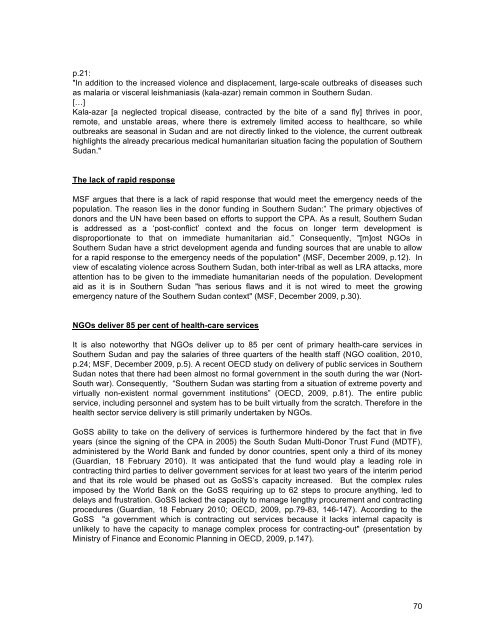SUDAN: Durable solutions elusive as southern IDPs return and ...
SUDAN: Durable solutions elusive as southern IDPs return and ...
SUDAN: Durable solutions elusive as southern IDPs return and ...
You also want an ePaper? Increase the reach of your titles
YUMPU automatically turns print PDFs into web optimized ePapers that Google loves.
p.21:<br />
"In addition to the incre<strong>as</strong>ed violence <strong>and</strong> displacement, large-scale outbreaks of dise<strong>as</strong>es such<br />
<strong>as</strong> malaria or visceral leishmani<strong>as</strong>is (kala-azar) remain common in Southern Sudan.<br />
[…]<br />
Kala-azar [a neglected tropical dise<strong>as</strong>e, contracted by the bite of a s<strong>and</strong> fly] thrives in poor,<br />
remote, <strong>and</strong> unstable are<strong>as</strong>, where there is extremely limited access to healthcare, so while<br />
outbreaks are se<strong>as</strong>onal in Sudan <strong>and</strong> are not directly linked to the violence, the current outbreak<br />
highlights the already precarious medical humanitarian situation facing the population of Southern<br />
Sudan."<br />
The lack of rapid response<br />
MSF argues that there is a lack of rapid response that would meet the emergency needs of the<br />
population. The re<strong>as</strong>on lies in the donor funding in Southern Sudan:” The primary objectives of<br />
donors <strong>and</strong> the UN have been b<strong>as</strong>ed on efforts to support the CPA. As a result, Southern Sudan<br />
is addressed <strong>as</strong> a ‘post-conflict’ context <strong>and</strong> the focus on longer term development is<br />
disproportionate to that on immediate humanitarian aid.” Consequently, "[m]ost NGOs in<br />
Southern Sudan have a strict development agenda <strong>and</strong> funding sources that are unable to allow<br />
for a rapid response to the emergency needs of the population" (MSF, December 2009, p.12). In<br />
view of escalating violence across Southern Sudan, both inter-tribal <strong>as</strong> well <strong>as</strong> LRA attacks, more<br />
attention h<strong>as</strong> to be given to the immediate humanitarian needs of the population. Development<br />
aid <strong>as</strong> it is in Southern Sudan "h<strong>as</strong> serious flaws <strong>and</strong> it is not wired to meet the growing<br />
emergency nature of the Southern Sudan context" (MSF, December 2009, p.30).<br />
NGOs deliver 85 per cent of health-care services<br />
It is also noteworthy that NGOs deliver up to 85 per cent of primary health-care services in<br />
Southern Sudan <strong>and</strong> pay the salaries of three quarters of the health staff (NGO coalition, 2010,<br />
p.24; MSF, December 2009, p.5). A recent OECD study on delivery of public services in Southern<br />
Sudan notes that there had been almost no formal government in the south during the war (Nort-<br />
South war). Consequently, “Southern Sudan w<strong>as</strong> starting from a situation of extreme poverty <strong>and</strong><br />
virtually non-existent normal government institutions” (OECD, 2009, p.81). The entire public<br />
service, including personnel <strong>and</strong> system h<strong>as</strong> to be built virtually from the scratch. Therefore in the<br />
health sector service delivery is still primarily undertaken by NGOs.<br />
GoSS ability to take on the delivery of services is furthermore hindered by the fact that in five<br />
years (since the signing of the CPA in 2005) the South Sudan Multi-Donor Trust Fund (MDTF),<br />
administered by the World Bank <strong>and</strong> funded by donor countries, spent only a third of its money<br />
(Guardian, 18 February 2010). It w<strong>as</strong> anticipated that the fund would play a leading role in<br />
contracting third parties to deliver government services for at le<strong>as</strong>t two years of the interim period<br />
<strong>and</strong> that its role would be ph<strong>as</strong>ed out <strong>as</strong> GoSS’s capacity incre<strong>as</strong>ed. But the complex rules<br />
imposed by the World Bank on the GoSS requiring up to 62 steps to procure anything, led to<br />
delays <strong>and</strong> frustration. GoSS lacked the capacity to manage lengthy procurement <strong>and</strong> contracting<br />
procedures (Guardian, 18 February 2010; OECD, 2009, pp.79-83, 146-147). According to the<br />
GoSS "a government which is contracting out services because it lacks internal capacity is<br />
unlikely to have the capacity to manage complex process for contracting-out" (presentation by<br />
Ministry of Finance <strong>and</strong> Economic Planning in OECD, 2009, p.147).<br />
70
















